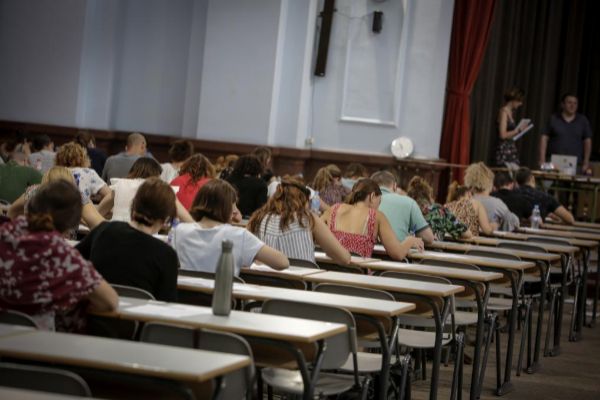In Spain, access to the public service is inspired by the Constitution, which in its article 103.3 states that it will be "in accordance with the principles of merit and capacity". The system established to guarantee these principles has been that of oppositions, which has given, today, very good results.
The opposition court is composed of a series of members and experts of proven competence, among which the members of the body to which they aspire are a minority by law. The candidate, meanwhile, must pass a succession of exams in public sessions, open to all citizens. During the process, the opponents demonstrate their knowledge and preparation, in an absolutely objective way in the exams and somewhat more valuable in the presentation of topics or in the written essay, followed by their reading and defense in public . There is also evidence on language knowledge, ability to analyze and manage practical situations, and the set allows you to fully evaluate the candidate and conclude a rigorous and transparent selection process.
This system of oppositions provides important advantages, although it also presents some imbalance that, in our opinion, should be taken into account to find a solution.
The first strong point of the current model is that it is a meritocratic system , in which anyone who wants it can compete in absolute equality of conditions with the other applicants. It is not necessary to have trained in any specific type of center, public or private, or be in any way close to those responsible for the selection.
Second, the opposition guarantees the independence of the official , which benefits the citizen against the Administration. He has accessed the civil service only thanks to his own effort and worth and has no debt of gratitude to anyone. This equips him perfectly to ensure continuity in the public service, and to guarantee the stability of the state apparatus in times of turbulence. Our Constitution defines it in article 103.1 as serving "with objectivity the general interests".
The third advantage of the current public service access system refers to the quality of its results, insofar as it guarantees the selection of those who have proven to be better prepared . Being president of the Government, Felipe González defended that a State that enjoys good health must have an "Ipanema Administration", that is to say athletic, agile, effective, neither hypertrophied nor squalid. That is guaranteed, rather than by the number, which must be sufficient, by the quality of its members. This gives satisfaction to a demand from society, which logically wants the person who will be at your service to be the best in the functions that are demanded of it, the one with the greatest merit and capacity among the applicants. All that remains is to provide these servers with the necessary means of work to achieve excellence.
There is an additional advantage, which is more for society than for the opponent: the current access system is cheaper than any alternative , because the training is paid by the applicant and, simply, is verified in the examination process. Only once the first phase of the opposition is over, the trainee receives a complementary training. This situation has a positive, even beautiful, element: the opponent, in his desire to serve society, begins by returning in some way what he has received through public education.
But this is also one of the main imbalances of the system: the cost of opposing, even in terms of lost profits for the years in which the incorporation or permanence in working life is frozen. This cost cannot and should not be borne by all .
One way to alleviate this situation is to grant scholarships to candidates with fewer resources, better academic records or both. Naturally, for the granting of such scholarships, a transparent system based on objective criteria established in advance must be implemented, so that the outcome of the process is not distorted beforehand.
You can also look for formulas that complement some of the current models of oppositions, adding to the knowledge tests, where there are none, other exams that allow an objective evaluation of a broader spectrum of competencies and skills of the candidate. Always, of course, guaranteeing that access to the public service is in accordance with the principles of merit and capacity . The associations of officials will be attentive to that.
In no case should the establishment of easier access systems be considered. This would lead to random results and inevitably lower the quality of public officials. Less desirable are still practices such as the functioning of interim through oppositions of a few places called to suit those who want to privilege . The most difficult, but correct, path is rather to guarantee the official living and working conditions that make the opponent worth the effort he must make.
Let me conclude with a reference to George Kennan , American ambassador and undisputed reference in the Cold War, who published in 1997 an analysis of the foreign service that had been launched in his country after World War II. The article was called Diplomacy without diplomats, and he wrote: "We could have had a diplomatic service as good as the best. But our Government could not accept a body so little politicized and selected so rigorously."
Let's be as good as the best.
Javier García-Larrache is vice president of Fedeca and president of the Association of Spanish Diplomats.
According to the criteria of The Trust Project
Know more- Spain
- Felipe Gonzalez
- WWII
- Opinion
- Oppositions
- Officials
Tribune The Badly Learned Lesson
Turn of the pageThe Portuguese letter of Sánchez
Intellectuals and Spain Javier Moreno Luzón: "It is bad for the system that Citizens give up being a hinge"

